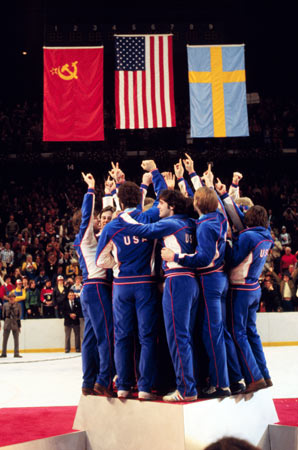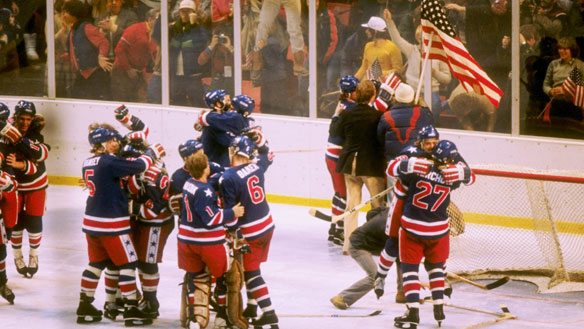 General
General  General Archive
General Archive  A Gold Medal Memory
A Gold Medal Memory
What would the Miracle on Ice have become if the United States did not finish their mission? How would we celebrate the greatest achievement in sports history if the team choked two days later against Team Finland? What would be the legacy of the 1980 US Men’s Olympic Hockey Team? Jim Craig said it best after the Russia game when he said, “If we don’t win tomorrow, people will forget us.”
if the team choked two days later against Team Finland? What would be the legacy of the 1980 US Men’s Olympic Hockey Team? Jim Craig said it best after the Russia game when he said, “If we don’t win tomorrow, people will forget us.”
Luckily, we do not have to answer those questions. Herb Brooks’ bunch took care of business, coming from behind to beat the Finns. The US team trailed in every game of the tournament except for the game against Romania that they won 7-2. They had a flare for the dramatic right from the start, tying Sweden with 27 seconds left on a goal by Bill Baker.
On February 24, as written in the movie “Miracle”, “the dream was made complete”. The US team downed Finland 4-2, scoring three goals in the third period to erase a 2-1 deficit. Rob McClanahan, called out in front of his teammates during the Sweden game as an Herb Brooks motivation tactic, scored the game winning goal.
Many people falsely believe that the 1980 team beat the Russians for the gold. In fact, because of the point system used during the Lake Placid games, the Americans could have pulled off the Miracle and still not even medaled. It is hard to fathom the greatest sports upset in history being diminished by the fact that the team failed to medal. To use a Cleveland-centric sports analogy, it would have been like the Indians’ 12-run comeback against the Seattle Mariners in August 2001 resulting in them losing the game anyway in extra innings. The difference obviously being that the Cleveland Indians had tomorrow. The 1980 US Men’s Olympic hockey team did not.
But, thanks to the conditioning regiment Coach Brooks had the team prepared under and his inspirational, if not poignant, pre-game speech of, “You lose this game and you’ll take it to your [expletive]in’ grave”, the Americans finished their quest and won the gold medal. For the United States, it was their second goal medal in men’s ice hockey. Their first came in 1960 in Squaw Valley, CA.
Heading in to the 1980 Lake Placid games, the United States was ranked seventh among the 12 participating teams. Russia was first, followed by Czechoslovakia, Sweden, Canada, West Germany and then Finland. The Czechs and Canadians finished fifth and sixth respectively.
For the United States team, Jim Craig was obviously the star. He played 419 minutes and 36 seconds in the tournament, with a 2.15 goals against average and a ,915 save percentage. Mark Johnson was the team’s leading scorer with five goals and six assists in the seven games, tying him for ninth in scoring.
The following are some post-tournament excerpts from Wayne Coffey’s “The Boys of Winter”:
After the Soviets were awarded their silver medals, they never turned them back in to have their named inscribed on them – the customary procedure. “I don’t have mine,” (Vladimir) Makarov said, “I think it is in garbage in Lake Placid jail.”
After the Russians cleared out of their rooms in the Lake Placid Olympic Village, cleanup workers for 121 empty vodka bottles in the dropped ceiling of their units, the detritus of despondence.
In the seventeen years of the NHL draft to that point, there had been 1,780 players selected and not one was an American high school player. Two years later, 47 of 252 was an American high schooler.
The fact is, this Olympic tournament and these two games, the Miracle on Ice on February 22, 1980 and the completion of the miraculous, the gold medal winning game on February 24, 1980 deeply affected a lot of people. From the players and coaches themselves to the new crop of hockey players that the tournament produced to the millions of Americans fixated with this group of college kids, emotions spilled out in all facets of daily life.
The players left as heroes. Rallies and parades in their hometowns or raucous ovations on the plane flight home were their welcome home. In a country that desperately needed good news, it came from one of the most unlikely sources. Hockey has never been near the level of the other three major sports in the United States, except for maybe the couple months following the Lake Placid games.
National pride tends to come together in times of turmoil. Times like 9/11/2001, the US entering a war, or a horrible natural disaster. Rarely do the citizens of this great nation have the chance to celebrate something together as one. The 1980 Lake Placid Olympics gave them the chance to do that.
As TCF writer Brian McPeek said, “I saw my old man with tears in his eyes twice in my life: the day his mom died and the day the United States hockey team climbed up on the podium as one.
The hockey match didn't make people here love their country. It just helped them remember why they did.”
 It helped people remember why they love their country. Because our nation, founded on standing up unified against unfair, tyrannical treatment from England, has the ability to mobilize together like no other nation in the world. Twenty people and two coaches formed a microcosm of the American spirit at its pinnacle to create a moment unlike any other.
It helped people remember why they love their country. Because our nation, founded on standing up unified against unfair, tyrannical treatment from England, has the ability to mobilize together like no other nation in the world. Twenty people and two coaches formed a microcosm of the American spirit at its pinnacle to create a moment unlike any other.
In the quiet, serene, picturesque Adirondack Mountains lies a small village of less than 3,000 people. It is a place where people earn an honest living on the banks of a 2,170 acre lake, dealing with never-ending snowfalls and influxes of tourists to ski Mount Whiteface. But, it was here that the American spirit reached a crescendo. It was here that the United States of America was able to believe in miracles.
- NBA Announces 2013-2014 Schedule
- Browns Ink Sharknado
- Sharknado A No-Show For Rookie Camp
- Trent Richardson Out Until Training Camp
- Browns Sign Brandon Jackson
- Carrasco Suspended Eight Games
- Browns Add to Wide Receiver Depth with David Nelson
- Browns Need to Learn from Past Draft Mistakes
- Browns Release Chris Gocong and Usama Young
- Browns Missing on Grimes Disappointing, But Not The End
The TCF Forums
- Movies coming out
rebelwithoutaclue (Tuesday, January 21 2014 12:56 PM) - 2015 Recruiting
jclvd_23 (Tuesday, January 21 2014 12:38 PM) - The 2014 Offseason Thread
Larvell Blanks (Tuesday, January 21 2014 12:25 PM) - Official- Browns Coach Search/Rumors
Larvell Blanks (Tuesday, January 21 2014 11:53 AM) - Chris Grant's first 3 drafts
Kingpin74 (Tuesday, January 21 2014 10:13 AM) - Mike Brown
YahooFanChicago (Monday, January 20 2014 11:15 PM) - 2014 Hoops Hockey Hijinx
jpd1224 (Monday, January 20 2014 4:44 PM) - 2014 Recruiting
jclvd_23 (Monday, January 20 2014 2:26 PM) - Wish List - #4 Pick
Hikohadon (Monday, January 20 2014 1:26 PM) - #1 overall pick Anthony Bennett
TouchEmAllTime (Sunday, January 19 2014 1:28 PM)


